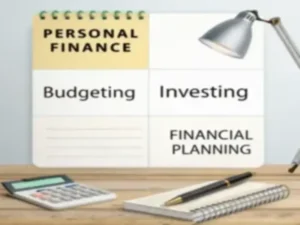In this article, we will provide in-depth researchable Personal finance advice for young adults to start financial planning. It helps them create a budget, understand investment, and have the financial literacy to set up for crucial success.
Getting financial footing can be highly challenging when you are a young adult. If you are a student, a new mortgage or student loan payment makes you feel penniless. In 2023, only 30 American states required personal finance courses for high school graduation. There still needs to be more personal finance for young adults to manage their money, stay out of debt, and apply for credit.
Our personal finance advice for young adults is to manage their money and gain financial independence. You need to acquire a series of financial skills that will allow you to get closer to your goals.
It does not matter how old you are! The matter is how to save money and reduce costs because you are already of age! Do you know how to use money properly?
Suppose you still have time to learn about personal finance advice for young adults for healthy finances and wiser money management. In that case, you still have time to learn about personal finance advice for young adults for healthy finances and wiser about managing your money.
Schools or universities rarely teach how to manage your money. However, this knowledge is crucial to lead a financially peaceful life. Young adults have many dreams and goals to set up their own company, buy their first car, purchase a home, travel, and many more.
All these dreams are very valid and inspiring, and we help to achieve their desires and improve their quality of life with some essential recommendations.
Starting on the right foot with personal finance can be daunting for young adults. With limited financial literacy and a lack of experience, it’s easy to fall into debt and financial instability.
However, with some basic knowledge and a few key strategies, managing money and building wealth can be achievable for anyone. In this article, we’ll explore some essential personal finance advice for young adults to help set them up for long-term financial success. Let’s dive in!
Read also: What Qualifications Need for Public Finance Investment Banking Job.
Key takeaways about personal finance
- Personal finance is crucial for young adults to manage their money, stay out of debt, and apply for credit.
- Learning about basic financial literacy and rules can build a healthy financial future.
- Acquiring financial skills is essential for gaining financial independence and achieving financial goals.
- Saving and making a retirement plan is integral, and your nest egg can grow with compound interest.
- Do in-depth research on personal finance to help set you up for long-term financial success.
- Start today with emergency funds and pay every month.
Personal Finance Advice for Young Adults to Build a Strong Financial Future
Below, we show personal finance advice for young adults that will make it easier to manage your healthy money.
Have an action plan for your goals
Personal goals continue after a college degree. That is just the beginning of a life full of desires to fulfill. So that these desires do not remain in your imagination, you must turn them into goals. Therefore, have an action plan to fulfill them. For this plan, keep the following in mind:
- Objective: the dream you want to fulfill in the medium or long term.
- Period: how long do you expect to achieve the objective? In this period, you must also meet the financial goal that goes hand in hand with the personal goal.
- Resources:What tools and financial resources will you need to meet your goal? Do you need to save? How much are you going to save monthly? Do you need to be subject to credit?
Learn to make ends meet
One of the most essential tips we can give you is to learn to make ends meet with enough money to avoid trouble. On the one hand, you will avoid financial stress and its consequences on your mental health. On the other hand, you will mark the beginning of stable finances. But how to make ends meet with money in your pockets?
Create a personal budget: detail your fixed and variable income and all your expenses, from those for survival to subscriptions to online TV services or music apps. The budget will help you know where your money is going, analyze whether it is worth spending on something, and make corrections to your finances.
Be a conscious buyer: the million-dollar question you must ask yourself is, “Do I need it, or do I just want it?” Become more conscious about what you buy and why. Above all, I prefer purchases that improve your quality of life over those that feed a difficult lifestyle.
Limit small expenses: these are all the small, frequent, and unplanned consumptions that seem harmless but represent a significant sum of money at the end of the month. Reduce them by including a limited amount in your budget, and you will see how you have money left over for other, more important expenses or savings.
Understand the importance of savings.
Savings are a portion of income not spent or invested and set aside for future use. Usually, they are kept in a Flexible Savings account at your bank, and money is not touched until it is used for something better. Why is it so important?
- It allows you to plan and meet medium or long-term goals.
- Protect your finances through an emergency fund.
- It becomes the capital for an investment.
- It is the beginning of personal assets.
- Discipline is cultivated when managing money.
For you to save your expenses must be less than your income; that is, you spend less than you earn. That leftover money is what you should allocate to savings and turn it into the support of intelligent and healthy finances.
Become a subject of credit.
At this point, we refer to the natural person or company that, after an analysis by the financial institution, qualifies for granting loans or credit cards. But why is it important for young people to become credit subjects?
It allows you to build a credit history that, with a good rating, strengthens the ability to assume increasingly more enormous debts in the future.
Loans or credit cards cover, along with savings, the costs of a goal that improves the quality of life.
Credit cards provide exclusive benefits for saving on purchases or taking advantage of personalized experiences.
Learn to use financial products.
Now that you are still young, it is the ideal time to learn how commercial banking financial products work in our country. Knowing how to use them appropriately is part of your financial education. It will help you avoid setbacks, and you will be able to get more out of them.
All financial products can offer you opportunities for economic growth if you know how to use them appropriately and with the seriousness they deserve. Let’s start with that learning right now!
Read also: The Best 5 Investment Blogs You Should Be Reading
The Bottom Line
In conclusion, personal finance is a crucial skill that every young adult should learn. You can achieve financial stability and build a secure future by following basic principles such as budgeting, saving and investing money, paying off debt, and investing.
It’s essential to start early and be consistent with your financial practices to reap maximum benefits in the long run. Financial freedom is achievable with discipline, patience, and intelligent planning.
This personal finance advice for young adults helps establish your goals and puts you on the right path.







